Unit 1 How can we become good learners. Section B (2a-2e)课件44张
文档属性
| 名称 | Unit 1 How can we become good learners. Section B (2a-2e)课件44张 | 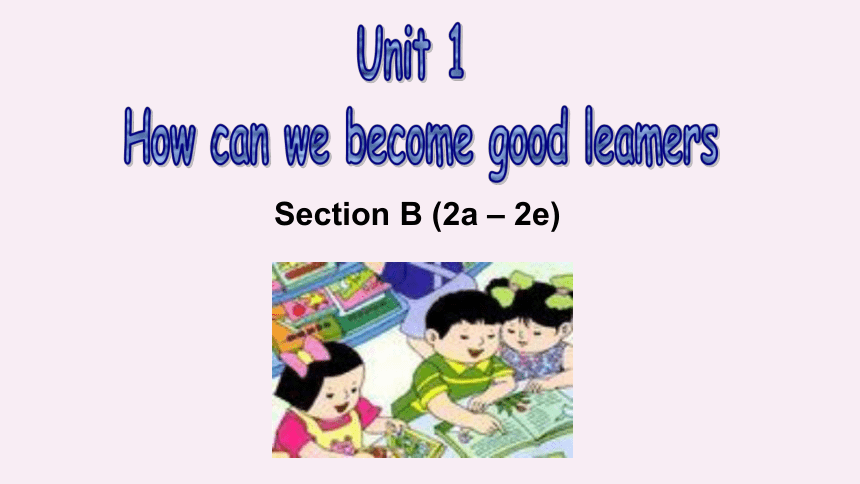 | |
| 格式 | zip | ||
| 文件大小 | 3.7MB | ||
| 资源类型 | 教案 | ||
| 版本资源 | 人教新目标(Go for it)版 | ||
| 科目 | 英语 | ||
| 更新时间 | 2021-09-04 16:29:33 | ||
图片预览

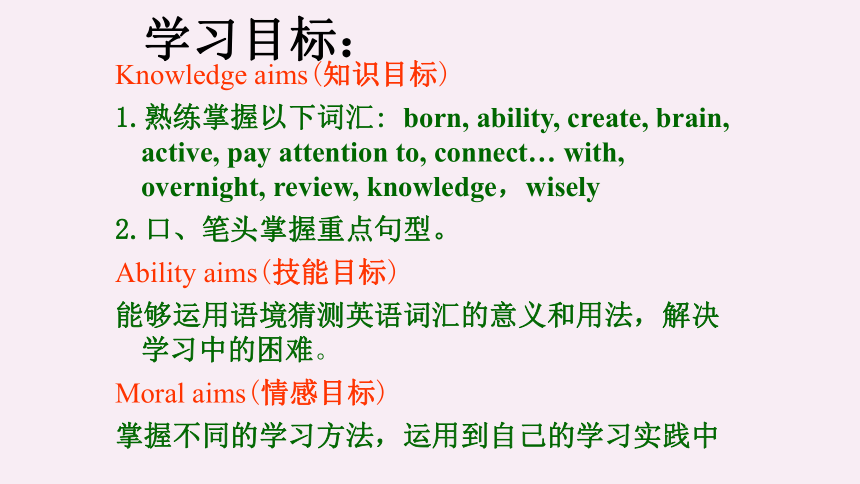
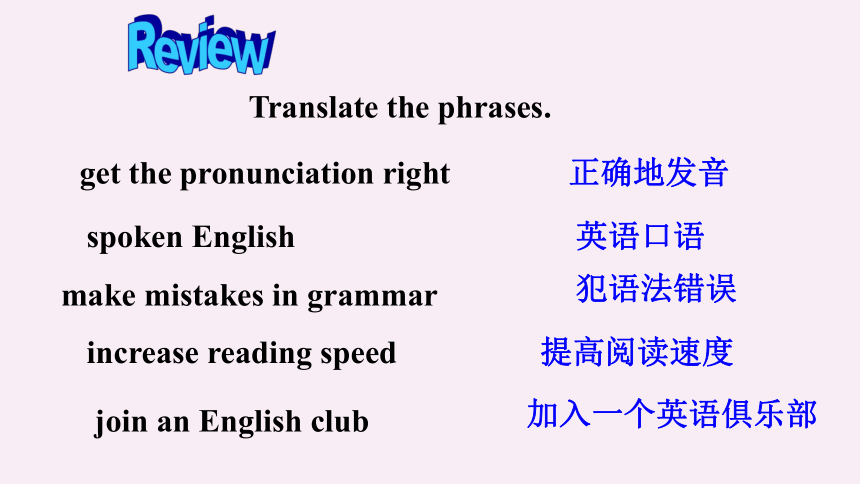
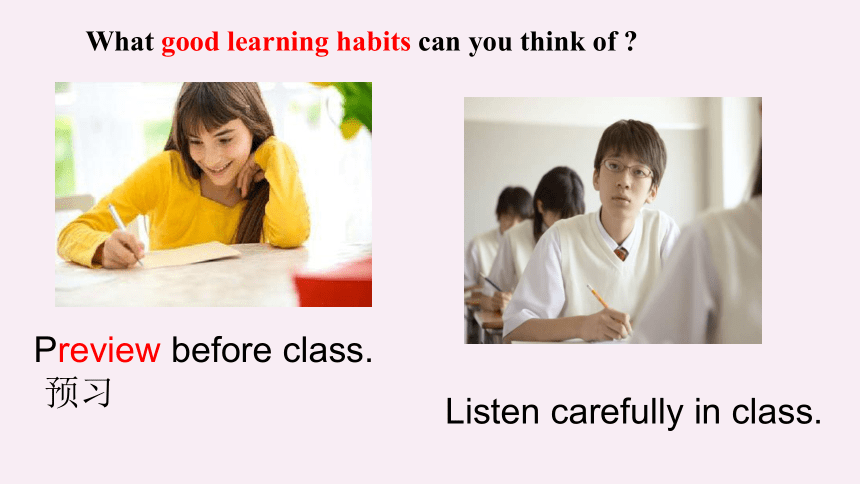

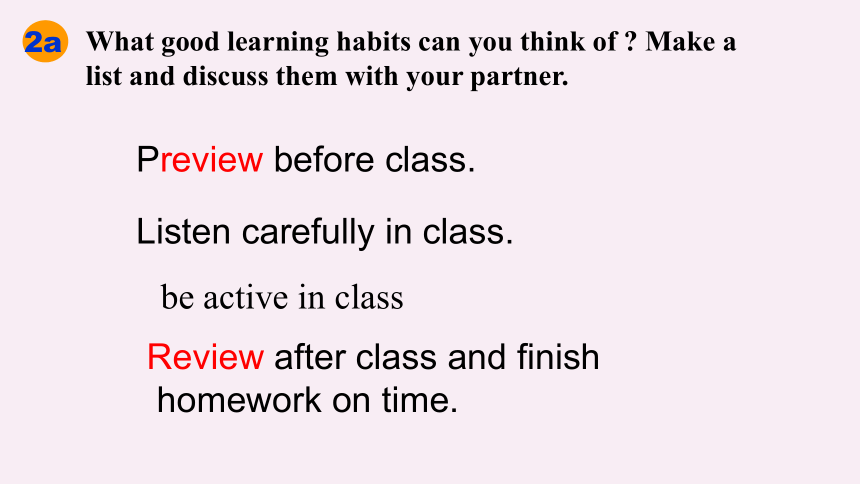
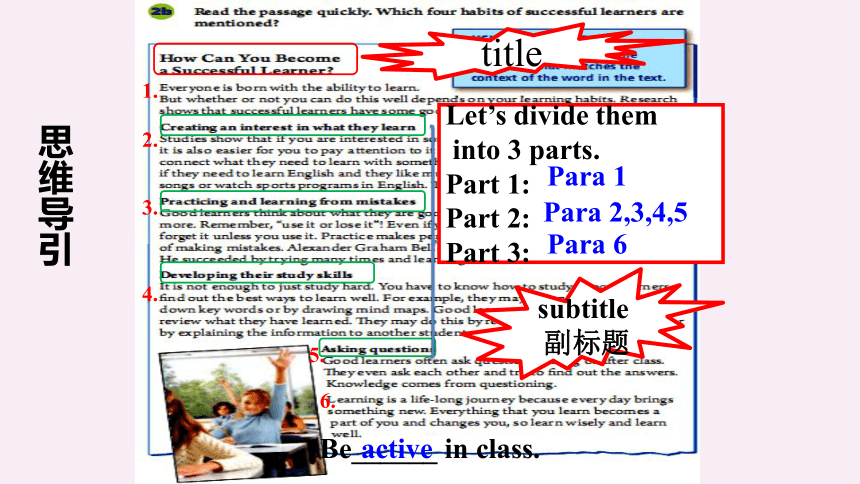
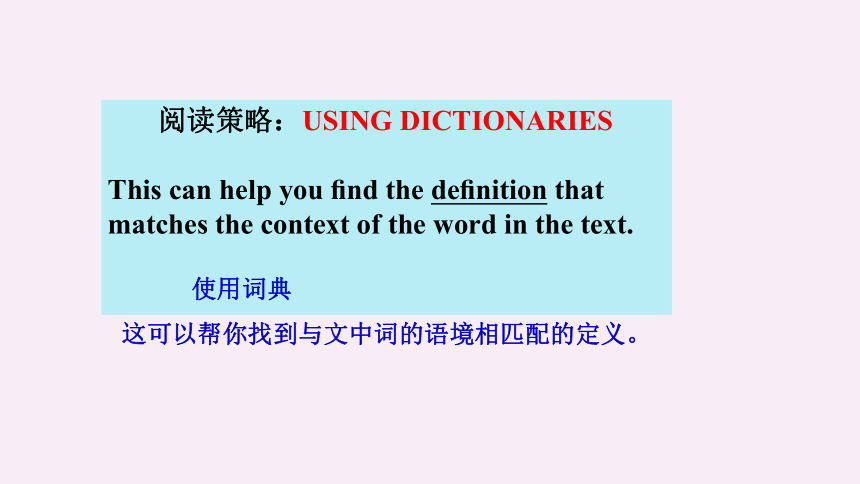
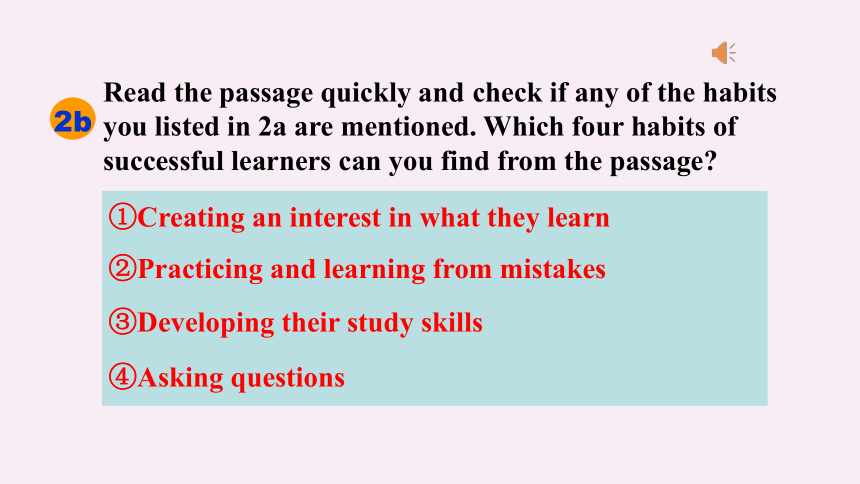
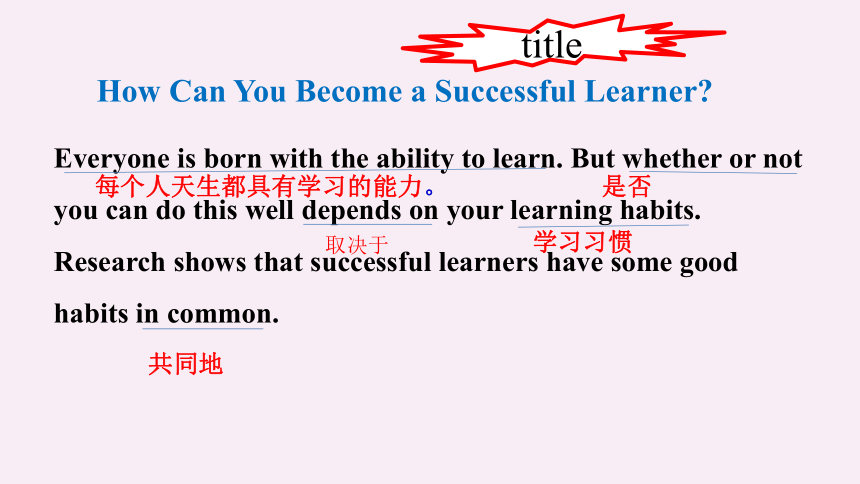
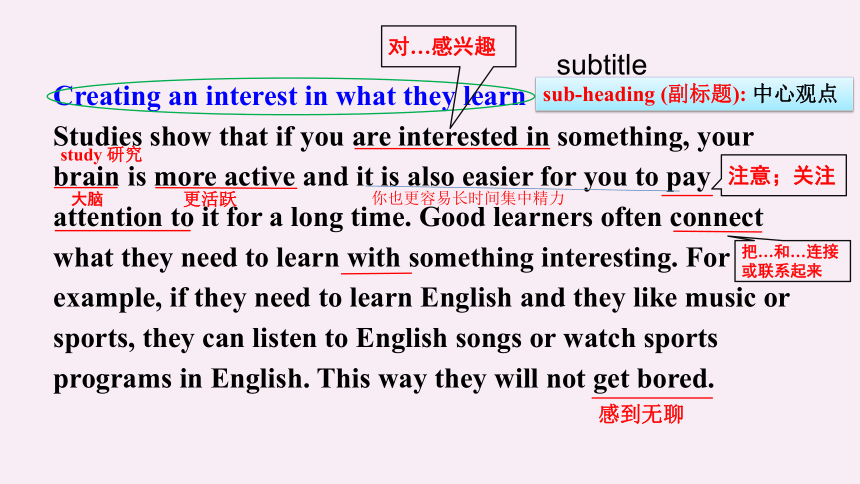
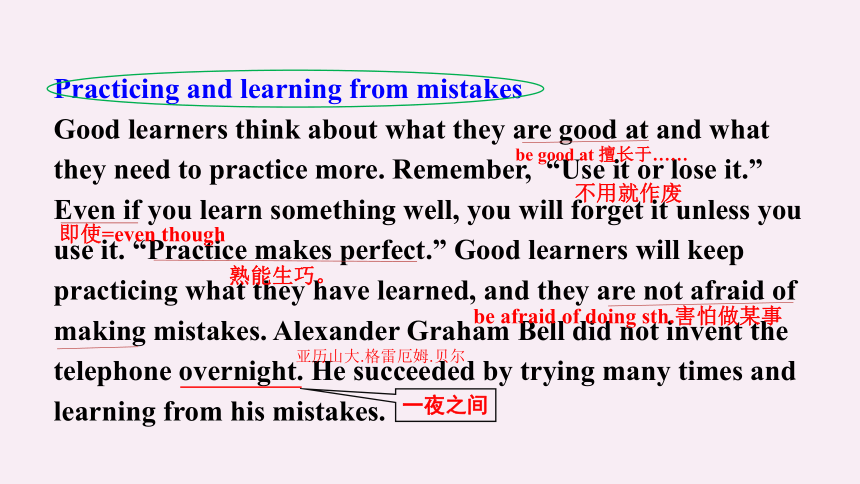
文档简介
(共44张PPT)
Unit
1
How
can
we
become
good
leamers
Section
B
(2a
–
2e)
Knowledge
aims(知识目标)
1.熟练掌握以下词汇:
born,
ability,
create,
brain,
active,
pay
attention
to,
connect…
with,
overnight,
review,
knowledge,wisely
2.口、笔头掌握重点句型。
Ability
aims(技能目标)
能够运用语境猜测英语词汇的意义和用法,解决学习中的困难。
Moral
aims(情感目标)
掌握不同的学习方法,运用到自己的学习实践中
学习目标:
Review
Translate
the
phrases.
提高阅读速度
犯语法错误
正确地发音
加入一个英语俱乐部
spoken
English
increase
reading
speed
make
mistakes
in
grammar
join
an
English
club
get
the
pronunciation
right
英语口语
What
good
learning
habits
can
you
think
of
?
Preview
before
class.
预习
Listen
carefully
in
class.
Be
active
in
class
Review
after
class
and
finish
homework
on
time.
2a
What
good
learning
habits
can
you
think
of
?
Make
a
list
and
discuss
them
with
your
partner.
Preview
before
class.
Listen
carefully
in
class.
be
active
in
class
Review
after
class
and
finish
homework
on
time.
subtitle
副标题
1.
2.
3.
4.
5.
6.
Let’s
divide
them
into
3
parts.
Part
1:
Part
2:
Part
3:
Para
1
Para
2,3,4,5
Para
6
title
Be______
in
class.
active
思维导引
阅读策略:USING
DICTIONARIES
This
can
help
you
?nd
the
de?nition
that
matches
the
context
of
the
word
in
the
text.
使用词典
这可以帮你找到与文中词的语境相匹配的定义。
2b
Read
the
passage
quickly
and
check
if
any
of
the
habits
you
listed
in
2a
are
mentioned.
Which
four
habits
of
successful
learners
can
you
find
from
the
passage?
Creating
an
interest
in
what
they
learn
②Practicing
and
learning
from
mistakes
③Developing
their
study
skills
④Asking
questions
How
Can
You
Become
a
Successful
Learner?
Everyone
is
born
with
the
ability
to
learn.
But
whether
or
not
you
can
do
this
well
depends
on
your
learning
habits.
Research
shows
that
successful
learners
have
some
good
habits
in
common.
title
每个人天生都具有学习的能力。
是否
取决于
学习习惯
共同地
Creating
an
interest
in
what
they
learn
Studies
show
that
if
you
are
interested
in
something,
your
brain
is
more
active
and
it
is
also
easier
for
you
to
pay
attention
to
it
for
a
long
time.
Good
learners
often
connect
what
they
need
to
learn
with
something
interesting.
For
example,
if
they
need
to
learn
English
and
they
like
music
or
sports,
they
can
listen
to
English
songs
or
watch
sports
programs
in
English.
This
way
they
will
not
get
bored.
sub-heading
(副标题):
中心观点
对…感兴趣
大脑
注意;关注
把…和…连接或联系起来
study
研究
更活跃
感到无聊
subtitle
你也更容易长时间集中精力
Practicing
and
learning
from
mistakes
Good
learners
think
about
what
they
are
good
at
and
what
they
need
to
practice
more.
Remember,
“Use
it
or
lose
it.”
Even
if
you
learn
something
well,
you
will
forget
it
unless
you
use
it.
“Practice
makes
perfect.”
Good
learners
will
keep
practicing
what
they
have
learned,
and
they
are
not
afraid
of
making
mistakes.
Alexander
Graham
Bell
did
not
invent
the
telephone
overnight.
He
succeeded
by
trying
many
times
and
learning
from
his
mistakes.
一夜之间
be
good
at
擅长于……
不用就作废
即使=even
though
熟能生巧。
be
afraid
of
doing
sth.害怕做某事
亚历山大.格雷厄姆.贝尔
Developing
their
study
skills
It
is
not
enough
to
just
study
hard.
Good
learners
know
the
best
way
they
can
study.
For
example,
they
may
take
notes
by
writing
down
key
words
or
by
drawing
mind
maps.
They
also
look
for
ways
to
review
what
they
have
learned.
They
may
do
this
by
reading
their
notes
every
day
or
by
explaining
the
information
to
another
student.
复习;回顾
画思维导图
记笔记
写下来
Asking
questions
Good
learners
often
ask
questions
during
or
after
class.
They
even
ask
each
other
and
try
to
find
out
the
answers.
Knowledge
comes
from
questioning.
互相;彼此
知识来源于质疑。
Learning
is
a
lifelong
journey
because
every
day
brings
something
new.
Everything
that
you
learn
becomes
a
part
of
you
and
changes
you,
so
learn
wisely
and
learn
well.
学习是一个终生的旅程
……的一部分
明智地,聪明地
habits
proofs
Creating
an
interest
in
what
they
learn
Studies
show
that
if
you
are
interested
in
sth.
your
brain
is
more
active
and
it
is
also
easier
for
you
to
pay
attention
to
it
for
a
long
time.
Read
sub-headings,
the
first
sentence
and
the
last
sentence
of
each
paragraph,
then
complete
the
table.
Task
1
habits
proofs
Use
it
or
lose
it.
It
is
not
enough
to
just
study
hard.
Knowledge
comes
from
questioning.
Practice
makes
perfect.
Practicing
and
learning
from
mistakes
Developing
their
study
skills
Asking
questions
2c
Read
the
passage
again
and
answer
the
questions.
Does
the
writer
think
that
everyone
is
born
with
the
ability
to
learn
well?
Do
you
agree?
Why
or
why
not?
No,he/she
doesn't.
Yes,I
do.
Because
whether
or
not
you
can
do
this
well
depends
on
your
learning
habits.
2.
Why
is
it
a
good
idea
to
connect
something
you
need
to
learn
with
something
you
are
interested
in?
Because
if
you
are
interested
in
something,
your
brain
is
more
active
and
it
is
also
easier
for
you
to
pay
attention
to
it
for
a
long
time.
You
will
not
get
bored.
3.
What
do
the
sayings
“Use
it
or
lose
it”
and
“Practice
makes
perfect”
mean?
Do
you
agree
with
them?
(1)
Use
it
or
lose
it:
Even
if
we
learn
something
well,
we
will
forget
it
unless
we
use
it.
(2)
Practice
makes
perfect:
We
should
keep
practicing
what
we
have
learned
so
that
we
can
be
good
at
it.
(3)
Yes,
I
do.
谚语
4.
Do
good
learners
learn
from
mistakes,
or
are
they
afraid
of
making
mistakes?
Good
learners
learn
from
mistakes,
and
they
are
not
afraid
of
making
mistakes.
还是
5.
What
study
skills
does
the
writer
talk
about?
Do
you
have
those
study
skills?
Taking
notes
by
writing
down
key
words
or
by
drawing
mind
maps,
looking
for
ways
to
review
what
has
been
learned
and
doing
this
by
reading
notes
every
day
or
by
explaining
the
information
to
another
student.
Yes,
I
do./
No,
I
don’t.
6.
Do
you
agree
that
learning
is
a
lifelong
journey?
Why
or
why
not?
Yes,
I
do.
Because
every
day
brings
something
new.
2d
Look
up
the
following
words
from
the
passage
in
the
dictionary.
Then
write
a
sentence
for
each
word.
brain
n.
connect
v.
overnight
adv.
attention
n.
review
v.
knowledge
n.
ability
n.
active
adj.
wisely
adv.
e.g.
brain:
A
good
way
to
train
the
brain
is
to
do
some
math
exercises
every
day.
This
raiway
line
connects
Beijing
with
Guangzhou.
overnight:
attention:
review:
connect:
He
dreams
of
being
famous
overnight.
Please
pay
attention
to
what
I
am
saying.
listen
carefully
I'm
reviewing
my
English
notes.
knowledge:
ability:
active:
wisely:
We
can
learn
knowledge
from
books.
He
has
the
ability
to
run
fast.
Mike
takes
an
active
part
in
school
life.
学校活动
He
never
behaves
honestly,nor
wisely.
他的行为既不诚实,也不聪明。
and
2e
Do
you
think
you
are
a
good
learner?
What
learning
habits
do
you
think
are
useful?
Discuss
with
your
group
and
share
your
ideas
with
the
class.
Some
sentences
for
giving
opinions:
I
think…
I
feel…
I
believe…
It
is
important
to…
1.
Everyone
is
born
with
the
ability
to
learn.
(1)
be
born
in+地点/非具体时间
be
born
on+具体时间
I
was
born
in
a
small
village.
I
was
born
in
September.
I
was
born
on
September
5.
be
born
with
生而具有某种天赋或疾病
Jenny
was
born
with
a
very
good
memory.
珍妮天生记忆力好
拓展
(2)天生的
She
was
a
born
dancer.
have
ability
to
do
sth
He
has
the
ability
to
do
the
job.
他有能力做这份工作。
2.
But
whether
or
not
you
can
do
this
well
depends
on
your
learning
habits.
whether
or
not=whether…or
not
是否
Whether
she
will
come
or
not
is
still
a
problem.
=Whether
or
not
she
will
come
is
still
a
problem.
她是否会来还是个问题。
whether
or
not
还表示“不管......是否”,引导让步状语从句
Whether
or
not
we're
successful,we
can
be
sure
that
we
did
our
best.
depend
on+n/pron/doing
在这里的意思是“取决于……”
不能用于进行时态和被动语态
Your
success
depends
on
whether
you
work
hard
or
not.
你的成功取决于你是否努力工作。
Happiness
doesn’t
depend
on
who
you
are
or
what
you
have,
it
depends
only
on
what
you
think.
快乐不是取决于你是何人或你拥有什么,它只取决于你的想法。
depend
on
依赖;依靠
Good
health
depends
on
good
food,
exercise
and
enough
food.
健康依赖于良
好的食物,运动和充足的睡眠.
active
adj.
活跃的;积极的
Ms.
Brown
is
active
in
the
party.
布朗女士在晚会上很活跃。
active的比较级和最高级分别是
more
active和most
active
3.Studies
show
that
if
you
are
interested
in
something,
your
brain
is
more
active
and
it
is
also
easier
for
you
to
pay
attention
to
it
for
a
long
time.
常用短语:take
an
active
part
in,
意为“积极参加”
Please
take
an
active
part
in
the
sports
meeting!
请积极参加运动会!
pay
attention
to
注意
/
关注……(to是介词)+n/doing/+pron
You’d
better
pay
attention
to
this
word
in
the
English
exam
last
time.
你最好注意下上次英语考试中的这个单词。
pay
no
attention
to
pay
more
attention
to
.
4.Good
learners
often
connect
what
they
need
to
learn
with
something
they
are
interested
in.
“把……和……连接起来”,英文的表达方式是connect
...
with
...
The
bridge
connects
the
city
with
that
town.
这座桥把这个城市和那个小镇连接起来了。
Please
don’t
connect
this
person
with
that
person.
请不要把这个人和那个人联系在一起。
need
在此处为及物动词,意为“需要”
其后跟名词、代词、动词不定式或动词-ing形式。need作实义动词时,既可用于肯定句,也可用于否定句和疑问句,构成否定和疑问句时要借助助动词do/
does/
did.
I
need
a
lot
of
money
now.
我现在很需要钱。
You
need
to
take
good
care
of
your
mother.
你要好好照顾你妈妈。
5.for
example,
+单词/短语/句子
such
as
+单词或短语
还有一些其他的问题,比如说,我们没有足够的时间。
There
are
some
other
problems.
For
example,
we
don’t
have
enough
time.
许多国家的人说英语,比如说加拿大和美国。
People
in
many
countries
speak
English,
such
as
Canada
and
America.
6.
Even
if
you
learn
something
well,
you
will
forget
it
unless
you
use
it.
(1)Even
if
意为“即使,尽管”,用于引导让步状语从句,有退一步设想的意味,同义于“even
though”
I’ll
help
you,
even
if
I
must
stay
up
the
whole
night.
即使熬夜一整晚我也要帮助你。
(2)
forget
后直接跟名词、代词、动词不定式或动词-ing形式,但两者意义完全不同。
Forget
to
do
sth
和forget
doing
sth.
Forget
to
do
sth:
忘记去做某事
forget
doing
sth.
忘记做过某事
e.g.
I
forget
to
turn
off
the
light.
我忘记关灯了。
I
forget
turning
off
the
light.
我忘记已经关灯了。
7.
They
also
look
for
ways
to
review
what
they
have
learned.
(1)look
for
意为“寻找”
后跟名词或代词作宾语。
E.g.
They
are
looking
for
the
missing
child.
他们在寻找失踪的孩子。
比较:look
for,
find与
find
out
look
for,find,find
out
这三个词都有“找”的涵义,但具体用法有别:
1)look
for意为“寻找”,是有目的地找,强调“寻找”这一动作。如:
—What
are
you
looking
for?你在找什么?
—I'm
looking
for
my
bike.我在找我的自行车。
2)find意为“找到”“发现”,强调“找”的结果,其宾语往往是某个丢失的东西或人。如:
—Did
you
find
Li
Ming
yesterday?
你昨天找到李明了吗?
—No,we
looked
for
him
everywhere,but
didn't
find
him.
没有。我们到处找了,但没有找到他。
3)find
out着重表示通过理解、分析、思考、调查、询问等“弄清楚”“查明”一件事情,其后的宾语常常是某个情况、事实。如:
Please
find
out
when
the
train
leaves.
请查一下火车什么时候离站。
look
for:
寻找,强调寻找的动作和过程,是
有目的的寻找。
find:
找到,发现,通常指找到或发现具体的东西,也可指偶然发现某物或某种情况,强调结果。
find
out:
弄清,查明,多指通过调查、询问、研究后搞清楚、弄明白,含经过困难、曲折的意味。
8.
Knowledge
comes
from
questioning.
knowledge
n.
知识;学问
He
is
poor
in
money,
but
rich
in
knowledge.
他贫于金钱,
但富于学问。
knowledge是不可数名词,没有复数形式。
Thank
You!Thank
You!
Unit
1
How
can
we
become
good
leamers
Section
B
(2a
–
2e)
Knowledge
aims(知识目标)
1.熟练掌握以下词汇:
born,
ability,
create,
brain,
active,
pay
attention
to,
connect…
with,
overnight,
review,
knowledge,wisely
2.口、笔头掌握重点句型。
Ability
aims(技能目标)
能够运用语境猜测英语词汇的意义和用法,解决学习中的困难。
Moral
aims(情感目标)
掌握不同的学习方法,运用到自己的学习实践中
学习目标:
Review
Translate
the
phrases.
提高阅读速度
犯语法错误
正确地发音
加入一个英语俱乐部
spoken
English
increase
reading
speed
make
mistakes
in
grammar
join
an
English
club
get
the
pronunciation
right
英语口语
What
good
learning
habits
can
you
think
of
?
Preview
before
class.
预习
Listen
carefully
in
class.
Be
active
in
class
Review
after
class
and
finish
homework
on
time.
2a
What
good
learning
habits
can
you
think
of
?
Make
a
list
and
discuss
them
with
your
partner.
Preview
before
class.
Listen
carefully
in
class.
be
active
in
class
Review
after
class
and
finish
homework
on
time.
subtitle
副标题
1.
2.
3.
4.
5.
6.
Let’s
divide
them
into
3
parts.
Part
1:
Part
2:
Part
3:
Para
1
Para
2,3,4,5
Para
6
title
Be______
in
class.
active
思维导引
阅读策略:USING
DICTIONARIES
This
can
help
you
?nd
the
de?nition
that
matches
the
context
of
the
word
in
the
text.
使用词典
这可以帮你找到与文中词的语境相匹配的定义。
2b
Read
the
passage
quickly
and
check
if
any
of
the
habits
you
listed
in
2a
are
mentioned.
Which
four
habits
of
successful
learners
can
you
find
from
the
passage?
Creating
an
interest
in
what
they
learn
②Practicing
and
learning
from
mistakes
③Developing
their
study
skills
④Asking
questions
How
Can
You
Become
a
Successful
Learner?
Everyone
is
born
with
the
ability
to
learn.
But
whether
or
not
you
can
do
this
well
depends
on
your
learning
habits.
Research
shows
that
successful
learners
have
some
good
habits
in
common.
title
每个人天生都具有学习的能力。
是否
取决于
学习习惯
共同地
Creating
an
interest
in
what
they
learn
Studies
show
that
if
you
are
interested
in
something,
your
brain
is
more
active
and
it
is
also
easier
for
you
to
pay
attention
to
it
for
a
long
time.
Good
learners
often
connect
what
they
need
to
learn
with
something
interesting.
For
example,
if
they
need
to
learn
English
and
they
like
music
or
sports,
they
can
listen
to
English
songs
or
watch
sports
programs
in
English.
This
way
they
will
not
get
bored.
sub-heading
(副标题):
中心观点
对…感兴趣
大脑
注意;关注
把…和…连接或联系起来
study
研究
更活跃
感到无聊
subtitle
你也更容易长时间集中精力
Practicing
and
learning
from
mistakes
Good
learners
think
about
what
they
are
good
at
and
what
they
need
to
practice
more.
Remember,
“Use
it
or
lose
it.”
Even
if
you
learn
something
well,
you
will
forget
it
unless
you
use
it.
“Practice
makes
perfect.”
Good
learners
will
keep
practicing
what
they
have
learned,
and
they
are
not
afraid
of
making
mistakes.
Alexander
Graham
Bell
did
not
invent
the
telephone
overnight.
He
succeeded
by
trying
many
times
and
learning
from
his
mistakes.
一夜之间
be
good
at
擅长于……
不用就作废
即使=even
though
熟能生巧。
be
afraid
of
doing
sth.害怕做某事
亚历山大.格雷厄姆.贝尔
Developing
their
study
skills
It
is
not
enough
to
just
study
hard.
Good
learners
know
the
best
way
they
can
study.
For
example,
they
may
take
notes
by
writing
down
key
words
or
by
drawing
mind
maps.
They
also
look
for
ways
to
review
what
they
have
learned.
They
may
do
this
by
reading
their
notes
every
day
or
by
explaining
the
information
to
another
student.
复习;回顾
画思维导图
记笔记
写下来
Asking
questions
Good
learners
often
ask
questions
during
or
after
class.
They
even
ask
each
other
and
try
to
find
out
the
answers.
Knowledge
comes
from
questioning.
互相;彼此
知识来源于质疑。
Learning
is
a
lifelong
journey
because
every
day
brings
something
new.
Everything
that
you
learn
becomes
a
part
of
you
and
changes
you,
so
learn
wisely
and
learn
well.
学习是一个终生的旅程
……的一部分
明智地,聪明地
habits
proofs
Creating
an
interest
in
what
they
learn
Studies
show
that
if
you
are
interested
in
sth.
your
brain
is
more
active
and
it
is
also
easier
for
you
to
pay
attention
to
it
for
a
long
time.
Read
sub-headings,
the
first
sentence
and
the
last
sentence
of
each
paragraph,
then
complete
the
table.
Task
1
habits
proofs
Use
it
or
lose
it.
It
is
not
enough
to
just
study
hard.
Knowledge
comes
from
questioning.
Practice
makes
perfect.
Practicing
and
learning
from
mistakes
Developing
their
study
skills
Asking
questions
2c
Read
the
passage
again
and
answer
the
questions.
Does
the
writer
think
that
everyone
is
born
with
the
ability
to
learn
well?
Do
you
agree?
Why
or
why
not?
No,he/she
doesn't.
Yes,I
do.
Because
whether
or
not
you
can
do
this
well
depends
on
your
learning
habits.
2.
Why
is
it
a
good
idea
to
connect
something
you
need
to
learn
with
something
you
are
interested
in?
Because
if
you
are
interested
in
something,
your
brain
is
more
active
and
it
is
also
easier
for
you
to
pay
attention
to
it
for
a
long
time.
You
will
not
get
bored.
3.
What
do
the
sayings
“Use
it
or
lose
it”
and
“Practice
makes
perfect”
mean?
Do
you
agree
with
them?
(1)
Use
it
or
lose
it:
Even
if
we
learn
something
well,
we
will
forget
it
unless
we
use
it.
(2)
Practice
makes
perfect:
We
should
keep
practicing
what
we
have
learned
so
that
we
can
be
good
at
it.
(3)
Yes,
I
do.
谚语
4.
Do
good
learners
learn
from
mistakes,
or
are
they
afraid
of
making
mistakes?
Good
learners
learn
from
mistakes,
and
they
are
not
afraid
of
making
mistakes.
还是
5.
What
study
skills
does
the
writer
talk
about?
Do
you
have
those
study
skills?
Taking
notes
by
writing
down
key
words
or
by
drawing
mind
maps,
looking
for
ways
to
review
what
has
been
learned
and
doing
this
by
reading
notes
every
day
or
by
explaining
the
information
to
another
student.
Yes,
I
do./
No,
I
don’t.
6.
Do
you
agree
that
learning
is
a
lifelong
journey?
Why
or
why
not?
Yes,
I
do.
Because
every
day
brings
something
new.
2d
Look
up
the
following
words
from
the
passage
in
the
dictionary.
Then
write
a
sentence
for
each
word.
brain
n.
connect
v.
overnight
adv.
attention
n.
review
v.
knowledge
n.
ability
n.
active
adj.
wisely
adv.
e.g.
brain:
A
good
way
to
train
the
brain
is
to
do
some
math
exercises
every
day.
This
raiway
line
connects
Beijing
with
Guangzhou.
overnight:
attention:
review:
connect:
He
dreams
of
being
famous
overnight.
Please
pay
attention
to
what
I
am
saying.
listen
carefully
I'm
reviewing
my
English
notes.
knowledge:
ability:
active:
wisely:
We
can
learn
knowledge
from
books.
He
has
the
ability
to
run
fast.
Mike
takes
an
active
part
in
school
life.
学校活动
He
never
behaves
honestly,nor
wisely.
他的行为既不诚实,也不聪明。
and
2e
Do
you
think
you
are
a
good
learner?
What
learning
habits
do
you
think
are
useful?
Discuss
with
your
group
and
share
your
ideas
with
the
class.
Some
sentences
for
giving
opinions:
I
think…
I
feel…
I
believe…
It
is
important
to…
1.
Everyone
is
born
with
the
ability
to
learn.
(1)
be
born
in+地点/非具体时间
be
born
on+具体时间
I
was
born
in
a
small
village.
I
was
born
in
September.
I
was
born
on
September
5.
be
born
with
生而具有某种天赋或疾病
Jenny
was
born
with
a
very
good
memory.
珍妮天生记忆力好
拓展
(2)天生的
She
was
a
born
dancer.
have
ability
to
do
sth
He
has
the
ability
to
do
the
job.
他有能力做这份工作。
2.
But
whether
or
not
you
can
do
this
well
depends
on
your
learning
habits.
whether
or
not=whether…or
not
是否
Whether
she
will
come
or
not
is
still
a
problem.
=Whether
or
not
she
will
come
is
still
a
problem.
她是否会来还是个问题。
whether
or
not
还表示“不管......是否”,引导让步状语从句
Whether
or
not
we're
successful,we
can
be
sure
that
we
did
our
best.
depend
on+n/pron/doing
在这里的意思是“取决于……”
不能用于进行时态和被动语态
Your
success
depends
on
whether
you
work
hard
or
not.
你的成功取决于你是否努力工作。
Happiness
doesn’t
depend
on
who
you
are
or
what
you
have,
it
depends
only
on
what
you
think.
快乐不是取决于你是何人或你拥有什么,它只取决于你的想法。
depend
on
依赖;依靠
Good
health
depends
on
good
food,
exercise
and
enough
food.
健康依赖于良
好的食物,运动和充足的睡眠.
active
adj.
活跃的;积极的
Ms.
Brown
is
active
in
the
party.
布朗女士在晚会上很活跃。
active的比较级和最高级分别是
more
active和most
active
3.Studies
show
that
if
you
are
interested
in
something,
your
brain
is
more
active
and
it
is
also
easier
for
you
to
pay
attention
to
it
for
a
long
time.
常用短语:take
an
active
part
in,
意为“积极参加”
Please
take
an
active
part
in
the
sports
meeting!
请积极参加运动会!
pay
attention
to
注意
/
关注……(to是介词)+n/doing/+pron
You’d
better
pay
attention
to
this
word
in
the
English
exam
last
time.
你最好注意下上次英语考试中的这个单词。
pay
no
attention
to
pay
more
attention
to
.
4.Good
learners
often
connect
what
they
need
to
learn
with
something
they
are
interested
in.
“把……和……连接起来”,英文的表达方式是connect
...
with
...
The
bridge
connects
the
city
with
that
town.
这座桥把这个城市和那个小镇连接起来了。
Please
don’t
connect
this
person
with
that
person.
请不要把这个人和那个人联系在一起。
need
在此处为及物动词,意为“需要”
其后跟名词、代词、动词不定式或动词-ing形式。need作实义动词时,既可用于肯定句,也可用于否定句和疑问句,构成否定和疑问句时要借助助动词do/
does/
did.
I
need
a
lot
of
money
now.
我现在很需要钱。
You
need
to
take
good
care
of
your
mother.
你要好好照顾你妈妈。
5.for
example,
+单词/短语/句子
such
as
+单词或短语
还有一些其他的问题,比如说,我们没有足够的时间。
There
are
some
other
problems.
For
example,
we
don’t
have
enough
time.
许多国家的人说英语,比如说加拿大和美国。
People
in
many
countries
speak
English,
such
as
Canada
and
America.
6.
Even
if
you
learn
something
well,
you
will
forget
it
unless
you
use
it.
(1)Even
if
意为“即使,尽管”,用于引导让步状语从句,有退一步设想的意味,同义于“even
though”
I’ll
help
you,
even
if
I
must
stay
up
the
whole
night.
即使熬夜一整晚我也要帮助你。
(2)
forget
后直接跟名词、代词、动词不定式或动词-ing形式,但两者意义完全不同。
Forget
to
do
sth
和forget
doing
sth.
Forget
to
do
sth:
忘记去做某事
forget
doing
sth.
忘记做过某事
e.g.
I
forget
to
turn
off
the
light.
我忘记关灯了。
I
forget
turning
off
the
light.
我忘记已经关灯了。
7.
They
also
look
for
ways
to
review
what
they
have
learned.
(1)look
for
意为“寻找”
后跟名词或代词作宾语。
E.g.
They
are
looking
for
the
missing
child.
他们在寻找失踪的孩子。
比较:look
for,
find与
find
out
look
for,find,find
out
这三个词都有“找”的涵义,但具体用法有别:
1)look
for意为“寻找”,是有目的地找,强调“寻找”这一动作。如:
—What
are
you
looking
for?你在找什么?
—I'm
looking
for
my
bike.我在找我的自行车。
2)find意为“找到”“发现”,强调“找”的结果,其宾语往往是某个丢失的东西或人。如:
—Did
you
find
Li
Ming
yesterday?
你昨天找到李明了吗?
—No,we
looked
for
him
everywhere,but
didn't
find
him.
没有。我们到处找了,但没有找到他。
3)find
out着重表示通过理解、分析、思考、调查、询问等“弄清楚”“查明”一件事情,其后的宾语常常是某个情况、事实。如:
Please
find
out
when
the
train
leaves.
请查一下火车什么时候离站。
look
for:
寻找,强调寻找的动作和过程,是
有目的的寻找。
find:
找到,发现,通常指找到或发现具体的东西,也可指偶然发现某物或某种情况,强调结果。
find
out:
弄清,查明,多指通过调查、询问、研究后搞清楚、弄明白,含经过困难、曲折的意味。
8.
Knowledge
comes
from
questioning.
knowledge
n.
知识;学问
He
is
poor
in
money,
but
rich
in
knowledge.
他贫于金钱,
但富于学问。
knowledge是不可数名词,没有复数形式。
Thank
You!Thank
You!
同课章节目录
- Unit 1 How can we become good learners.
- Section A
- Section B
- Unit 2 I think that mooncakes are delicious!
- Section A
- Section B
- Unit 3 Could you please tell me where the restroom
- Section A
- Section B
- Unit 4 I used to be afraid of the dark.
- Section A
- Section B
- Unit 5 What are the shirts made of?
- Section A
- Section B
- Review of Units 1-5
- Unit 6 When was it invented?
- Section A
- Section B
- Unit 7 Teenagers should be allowed to choose their
- Section A
- Section B
- Unit 8 It must belong to Carla.
- Section A
- Section B
- Unit 9 I like music that I can dance to.
- Section A
- Section B
- Unit 10 You're supposed to shake hands.
- Section A
- Section B
- Review of Units 6-10
- Unit 11 Sad movies make me cry.
- Section A
- Section B
- Unit 12 Life is full of the unexpected
- Section A
- Section B
- Unit 13 We're trying to save the earth!
- Section A
- Section B
- Unit 14 I remember meeting all of you in Grade 7.
- Section A
- Section B
- Review of Units 11-14
